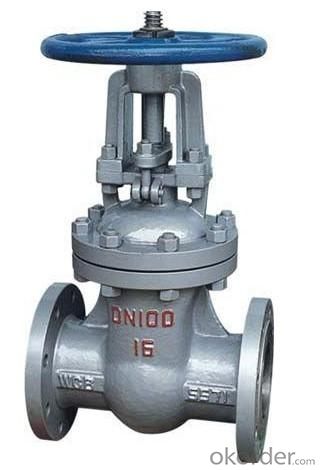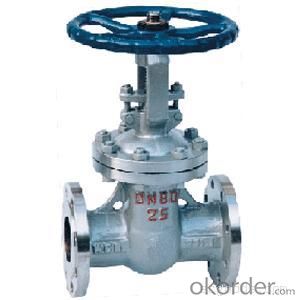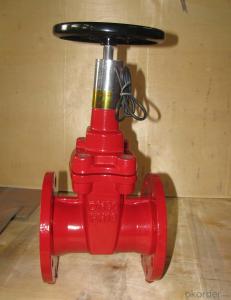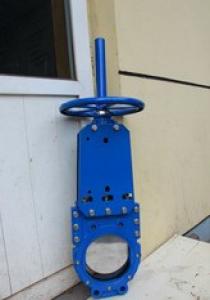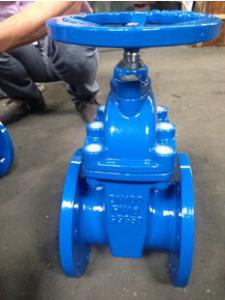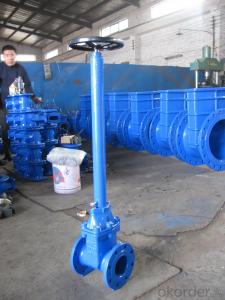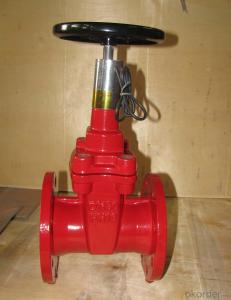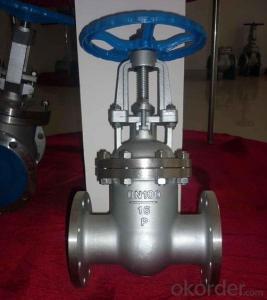Gate Valve for Ductile Iron Pipe with Good Quality
- Loading Port:
- China main port
- Payment Terms:
- TT or LC
- Min Order Qty:
- 1000 set
- Supply Capability:
- 10000 set/month
OKorder Service Pledge
OKorder Financial Service
You Might Also Like
1. Structure of Gate Valve Description:
1. Selected materials, in line with domestic and international standards, high overall quality of the material.
2. In line with the requirements of domestic and foreign advanced standards, reliable sealing, excellent performance, attractive appearance.
3. Sealing pair advanced and reasonable, gate and seat sealing surface with different hardness Stellite (Stellite) cobalt-based alloy cladding made, reliable sealing, high hardness, wear resistance, high temperature, corrosion good anti-abrasion performance, long life.
4. Stem quenched and nitride surface treatment, has good corrosion resistance, scratch resistance and abrasion resistance.
2. Main Features of the Gate Valve:
Working medium: water, non-corrosive liquid, saturated vapor (≤ 0.6MPa)
Operating temperature: -20 °C ≤ t ≤ 135 °C
Stem: non-rising stem
Body material:Brass/Stainless Steel
Connection:flanged
3. Images of the Gate Valve:
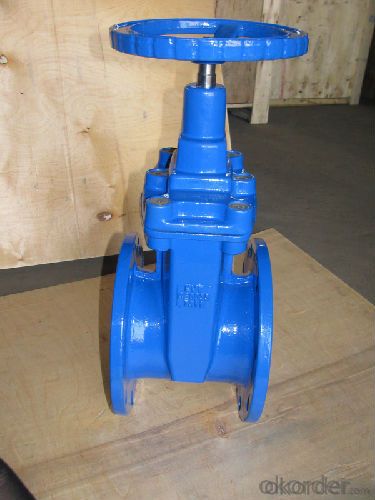
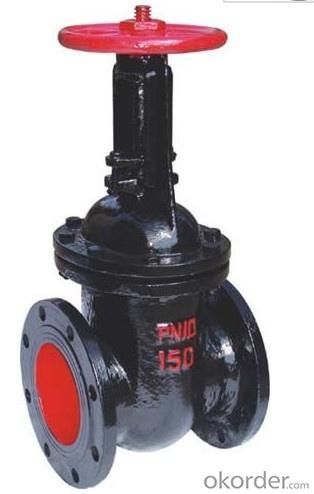
4. Specification of the Gate Valve:
1.Material:A105,A105N,F304,F304L,F316,F316L,LF2,F5,F11,F22,F347,F321,F51,Monel......
2.Size:≤3"
3.Pressure: Class150~2500
4.Design and Manufacture:API602,BS5352,ANSI B16.34
5.Test and Inspection:API598,GB/T13927,JB/T9092
6.Structure Features:
B.B(Bolted Bonnet) and OS&Y(Outside Screw and Yoke)
W.B(Welded Bonnet) and OS&Y(Outside Screw and Yoke)
5.FAQ
1. Can I get free samples?
A: Yes,we can provide you the free sample, but you need to bear their own delivery costs.
2. Can I request to change the form of packaging and transportation?
A:Yes, We can change the form of the packaging and transportation according to your request, but you have to bear their own costs incurred during this period and the spreads.
3. Can I request to advance the shipment?
A: It should be depends on whether there is sufficient inventory in our warehouse.
4. Can I have my own Logo on the product?
A: Yes, you can send us your drawing and we can make your logo, but you have to bear
their own the cost.
5. Can you produce the products according to my own drawings?
A:Yes,we can produce the products according to your drawings that will be most satisfy you.
- Q: How are ductile iron pipes protected against internal corrosion caused by chemicals?
- To safeguard against internal corrosion caused by chemicals, ductile iron pipes implement various protective measures. Primarily, these pipes are equipped with either a cement mortar lining or an epoxy coating, creating a barrier between the water or sewage's chemical substances and the iron material. This barrier effectively prevents direct contact, thereby averting corrosion. Additionally, a corrosion-resistant polymer or bituminous coating is frequently applied to the pipes' exterior. This supplementary layer of protection shields the pipes from potential chemical exposure originating externally. Moreover, cathodic protection is a commonly employed technique to counter internal corrosion. Sacrificial anodes, typically composed of zinc or magnesium, are affixed to the pipes. Over time, these anodes undergo corrosion instead of the iron, sacrificing themselves to safeguard the pipes against chemical-induced corrosion. Furthermore, regular maintenance and monitoring play a crucial role in the prevention and rectification of corrosion issues. This entails routine inspections, cleaning, and prompt repair of any corroded or damaged areas. Overall, the integration of lining, external coating, cathodic protection, and maintenance practices ensures the comprehensive protection of ductile iron pipes against internal corrosion caused by chemicals. This prolongs their lifespan and guarantees the integrity of the pipeline system.
- Q: How does ductile iron pipe perform in high-velocity flow conditions?
- Ductile iron pipe performs well in high-velocity flow conditions. Its inherent strength and durability make it resistant to the forces of high-velocity flow, minimizing the risk of damage or failure. The material's ability to withstand pressure surges and turbulence ensures reliable performance even in demanding flow conditions.
- Q: How are ductile iron pipes joined to fittings and valves?
- Ductile iron pipes are typically joined to fittings and valves using mechanical joint or push-on joint methods. The mechanical joint involves using a gland and a rubber gasket to create a tight seal when the pipe is bolted to the fitting or valve. On the other hand, push-on joint method uses a rubber gasket that is compressed when the pipe is pushed into the fitting or valve, providing a secure connection without the need for bolts or additional hardware.
- Q: The design uses water supply ductile iron pipe, PE corrosion protection pipe, HDPE pipe, please ask that good? What's the price of the two?
- Ductile iron pipes are difficult to make and do not make money, and even easy to lose money, it is not recommended to do, the price can be found on Baidu. DN100 6, about 400 yuan ~500 yuan, DN200,6 about 900 yuan ~1000 yuan, when the market to buy to ask a length. Difficult to do in ductile pipe easily affected by topography (when digging the trenching dug in front of the back of their repair, trouble), vulnerable to local soil effects (such as settlement). Parts connection is not fixed, easy to leak. The advantage is that once the installation is completed, the pressure test is successful and is used for life.
- Q: Do rigid cement cast iron pipes need cement piers?
- Ductile weakness: ductile cast iron pipes connected by human factors such as the operation level of responsibility, influence, construction not convenient. The advantages of PE PE PE pipe has good corrosion resistance and its anti inorganic performance than that of the metal pipe is much stronger in the buried without corrosion, construction convenient. Small diameter PE pipe in the price performance ratio is better than that of steel and ductile iron.PE tube have disadvantages: benzene, gasoline, carbon tetrachloride and other organic solvents have certain effect on pe. If the organic solvent is infiltrated into the polyethylene, the swelling will occur, and its physical properties will be decreased. Its pressure resistance and temperature resistance are poor.
- Q: How do ductile iron pipes handle water hammer?
- Ductile iron pipes possess excellent resistance to water hammer, which is the sudden increase in pressure and velocity of water flow in a pipe system. This occurrence happens when there is an abrupt change in water velocity, like the sudden closure of a valve or the immediate shutdown of a pump. The design of ductile iron pipes enables them to withstand high-pressure surges caused by water hammer. Their increased strength and flexibility allow them to absorb and dissipate the energy generated during these pressure surges. The material's ductility permits the pipe to undergo slight deformation when impacted by water hammer, preventing the pipe from rupturing or breaking. Moreover, ductile iron pipes possess inherent damping properties that make them more effective at absorbing and dissipating the energy of water hammer compared to other pipe materials. This aids in reducing the intensity and duration of pressure surges, thereby minimizing potential damage to the pipe system and its components. Furthermore, ductile iron pipes often come equipped with various fittings and accessories that further enhance their capability to handle water hammer. These include specialized joint designs like restrained joints or flexible couplings, which provide additional flexibility and resistance to pressure surges. In summary, ductile iron pipes are specifically engineered to address the challenges presented by water hammer. Their strength, flexibility, damping properties, and specialized fittings make them an ideal choice for applications where water hammer is a concern, offering a reliable and durable solution for water distribution systems.
- Q: What are the differences between cast iron pipes W and A?
- Cast iron drainage pipe generally divided into three categories, namely W type socket cast iron pipes, cast iron pipes of A type, B type cast iron drainage pipe, the three pipes have good seismic performance, strong sealing performance, simple construction, convenient maintenance, reliable use, so it is also called the cast iron pipe for earthquake.
- Q: Will the quality of ductile iron shrink?
- This is a ductile iron is prone to problems, manhole covers, large flat pieces, you have to see clearly, and some appear to be concave, not shrink, it may be caused by large gas emissions, not out
- Q: What is the difference between a PE fire hose and a ductile iron pipe?
- Cast iron pipe: cast pipe made of cast iron. Cast iron pipes are used for water supply, drainage and gas transmission lines. They include cast iron pipes and pipe fittings. Labor intensity is small. According to the casting method, it is divided into continuous cast iron pipe and centrifugal cast iron pipe, in which the centrifugal cast iron pipe is divided into sand mould and metal type two kinds. Divided into gray cast iron pipe and nodular cast iron pipe according to different material. According to the interface form, it is divided into flexible interface, flange interface, self anchored interface, rigid interface and so on. Among them, the flexible iron pipes rubber sealing ring; flange interface cast iron pipe flange fixed in the rubber pad, the flange gasket sealing; rigid interface cast iron pipe socket is large, straight pipe is inserted, sealed with cement, this technology has been basically eliminated.
- Q: Can ductile iron pipes be used for underground cooling water systems?
- Yes, ductile iron pipes can be used for underground cooling water systems. Ductile iron pipes are known for their durability, high strength, and resistance to corrosion, making them suitable for various applications, including underground installations. In cooling water systems, where the pipes are exposed to water and potentially harsh environments, ductile iron pipes provide a reliable and long-lasting solution. Their ability to withstand high pressure and temperature fluctuations further ensures the efficient and safe operation of the cooling water system. Additionally, ductile iron pipes are often preferred for underground installations due to their ease of installation, low maintenance requirements, and cost-effectiveness.
Send your message to us
Gate Valve for Ductile Iron Pipe with Good Quality
- Loading Port:
- China main port
- Payment Terms:
- TT or LC
- Min Order Qty:
- 1000 set
- Supply Capability:
- 10000 set/month
OKorder Service Pledge
OKorder Financial Service
Similar products
Hot products
Hot Searches
Related keywords


